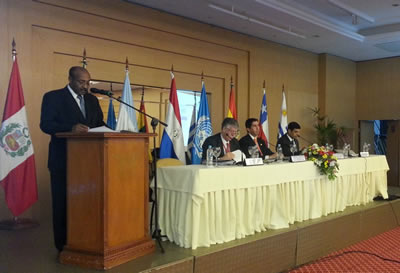Government Representatives and United Nations Experts Reviewed Advances and Challenges of Landlocked South American Countries

Government representatives from seven South American countries and United Nations experts met on 19 November in Asunción, Paraguay, to review the advances and challenges of the agreements adopted in 2003 in Almaty (Kazakhstan) in regard to landlocked countries worldwide.
According to United Nations data, there are 31 landlocked developing countries, including two in Latin America (Bolivia and Paraguay).
The Regional Meeting in Preparation for the Comprehensive 10-Year Review Conference on the Implementation of the Almaty Programme of Action was organized by the Government of Paraguay, the United Nations Office of the High Representative for the Least Developed Countries, Landlocked Developing Countries and Small Island Developing States and the Economic Commission for Latin America and the Caribbean (ECLAC).
In particular, delegates examined the four priority areas of the Almaty Programme of Action: transit policy issues; infrastructure development and maintenance; international trade and trade facilitation; and international support measures.
Delegates also discussed the challenges faced by landlocked countries, including food and fuel price volatility, financial crises, climate change and economic and social inequalities.
The Regional Preparatory Meeting was opened at 8.45 a.m. by the Vice-Minister for Economic Affairs and Integration of the Ministry of Foreign Affairs of Paraguay, Federico González, the United Nations Under-Secretary-General and High Representative for the Least Developed Countries, Landlocked Developing Countries and Small Island Developing States, Gyan Chandra Acharya, and the Deputy Executive Secretary of ECLAC, Antonio Prado.
The meeting was preceded by the Seminar on Economic development, logistical costs and the situation of landlocked developing countries, which was held on Monday 18 November in Asunción, with ECLAC experts presenting on the development of landlocked countries in South America and their integration performance.
The seminar and the Regional Preparatory Meeting used as a basis for discussion a document produced by ECLAC on the current situation of Bolivia and Paraguay, as well as the last decade's regional progress in terms of the above-mentioned Programme of Action.
In addition, representatives from the United Nations Office of the High Representative for the Least Developed Countries, Landlocked Developing Countries and Small Island Developing States presented a document on the situation of landlocked countries in other regions.
The discussions of this meeting will be part of the preparatory process for the next Conference on the Implementation of the Almaty Programme of Action, which is being organized by the United Nations General Assembly for 2014.
A preliminary programme is available on the ECLAC website at the following link.
Press contact:
ECLAC Public Information and Web Services Section.
ECLAC headquarters: Av. Dag Hammarskjold 3477, Vitacura, Santiago.
E-mail: prensa@cepal.org, Telephone: (562) 2210 2040.
Type
Country(ies)
- Bolivia
- Paraguay